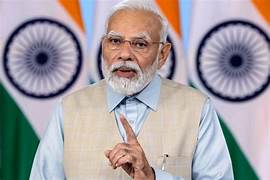
PM Modi to Unveil Two New Agricultural Schemes Tomorrow

 :
| Updated On: 10-Oct-2025 @ 1:00 pm
:
| Updated On: 10-Oct-2025 @ 1:00 pmSHARE
Prime Minister Narendra Modi is set to launch two significant agricultural initiatives on October 11, 2025, in New Delhi, coinciding with the birth anniversary of the renowned social leader Bharat Ratna Lok Nayak Jayaprakash Narayan, according to Union Agriculture Minister Shivraj Singh Chouhan. The two key schemes — the Pradhan Mantri Dhan Dhaanya Krishi Yojana (PMDDKY) and the Mission for Aatmanirbharta in Pulses — are aimed at boosting agricultural productivity, ensuring self-reliance in pulses, and improving the income and welfare of farmers across India. Both schemes were formally announced during the Union Budget 2025-26 and have received the necessary approval from the Cabinet, paving the way for their official rollout from the upcoming rabi (winter) season and set to continue until the 2030-31 agricultural year.
The Pradhan Mantri Dhan Dhaanya Krishi Yojana (PMDDKY) focuses on enhancing the production of cereals, particularly rice and wheat, with the broader objective of stabilizing grain output and supporting farmers’ income. By offering targeted financial and technical assistance, the scheme aims to equip farmers with better tools, seeds, and technology, thereby increasing yield and reducing crop loss. This initiative is designed to address challenges such as inconsistent monsoon patterns, rising input costs, and market fluctuations, while simultaneously contributing to the nation’s food security. Additionally, PMDDKY seeks to modernize traditional farming practices by promoting mechanization, improved irrigation, and adoption of scientific methods, ensuring sustainable and profitable agriculture.
The second initiative, the Mission for Aatmanirbharta in Pulses, is intended to strengthen India’s self-reliance in pulse production, an essential source of protein in the Indian diet. The mission will encourage farmers to cultivate pulses more extensively through incentives, access to quality seeds, and improved crop management practices. By expanding domestic production, the initiative aims to reduce dependence on imports, stabilize market prices, and ensure the availability of affordable pulses for consumers. It will also support farmer collectives and Farmer Producer Organisations (FPOs) by providing technical guidance, capacity building, and better access to markets, thus integrating small and marginal farmers into the broader value chain.
As part of the launch event, Prime Minister Modi will engage directly with beneficiaries of central agricultural schemes, highlighting the government’s commitment to inclusive growth and farmer welfare. Several members of FPOs will also be felicitated, acknowledging their contributions to improving agricultural productivity, organizing small farmers, and promoting sustainable practices. By recognizing these efforts, the government aims to inspire other farmer groups and encourage collaborative approaches to agriculture.
The rollout of these schemes reflects the government’s long-term vision of strengthening India’s agricultural sector and building resilience against challenges such as climate change, price volatility, and global supply chain disruptions. By implementing the programs from the upcoming rabi season through 2030-31, the government intends to provide sustained support to farmers over multiple crop cycles, enabling them to plan and invest confidently in their agricultural activities.
In conclusion, the launch of PMDDKY and the Mission for Aatmanirbharta in Pulses represents a strategic effort to enhance productivity, ensure food security, and promote self-reliance in Indian agriculture. These initiatives aim not only to benefit farmers economically but also to strengthen the overall agricultural ecosystem through modern practices, improved inputs, and robust institutional support. By combining financial incentives, technical assistance, and engagement with FPOs, the government seeks to create a more sustainable and profitable farming sector, aligning with India’s broader goals of rural development, nutritional security, and agricultural modernization.